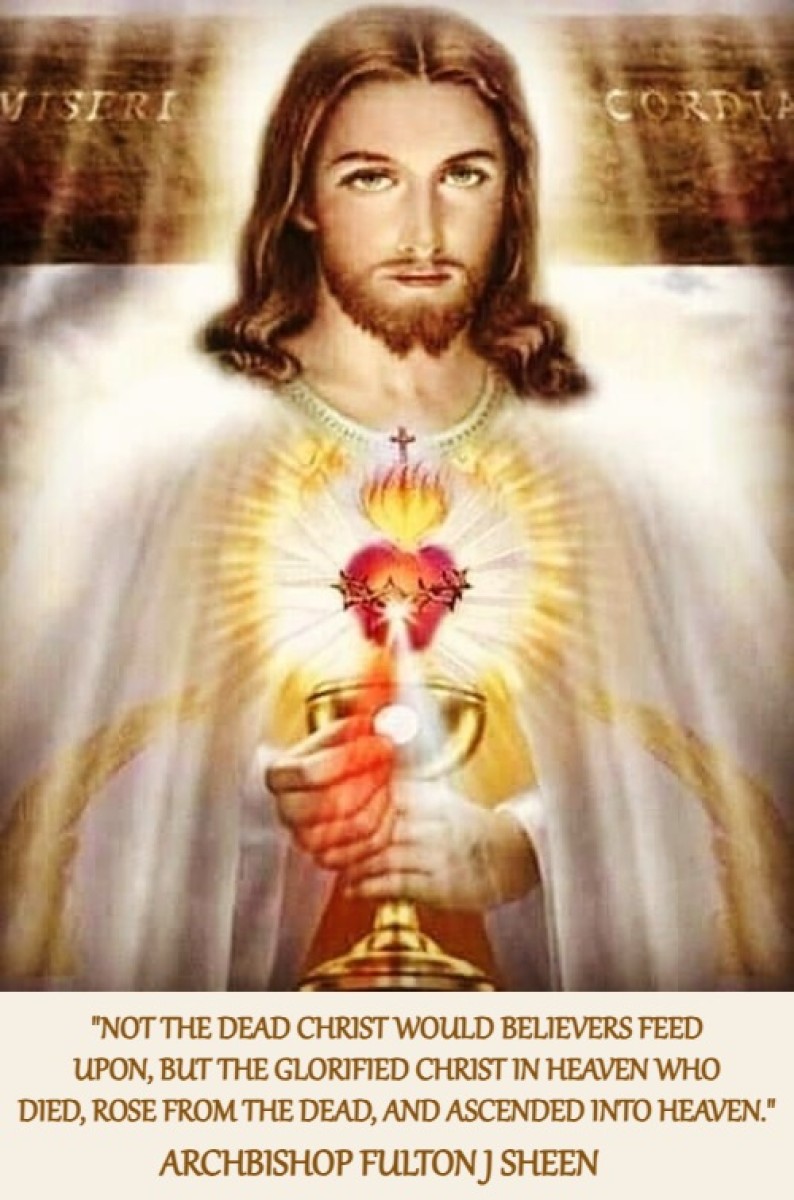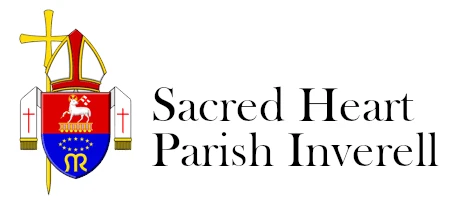20th Sunday in Ordinary Time (Year B) - 18 August
18th August 2024

“As by the Word of God, Jesus our Saviour was made Flesh and had both Flesh and Blood for our salvation, so also the food which has been blessed by the word of prayer instituted by Him is both the Flesh and Blood of Jesus Incarnate.” - St Justin the Martyr
A reflection on today's Gospel by the Venerable Archbishop Fulton J Sheen:
"As a Mediator between God and man, He said that, as He lived by the Father, so they would live by Him: 'As I live because of the Father, The living Father Who has sent Me, So he who eats Me will live, In his turn, because of Me.’ (John 6:58)
"How carnal was the eating of the manna, and how spiritual was the eating of the flesh of Christ! It was a far more intimate living by Him than a baby’s living by the nourishment supplied by the mother. Every mother to every child at her breast can say, ‘Eat, this is my body; this is my blood.’ But actually the comparison ends there; for in the mother-child relationship, both are on the same level. In the Christ-human relationship, the difference is that of God and man, heaven and earth. Furthermore, no mother ever has to die and take on a more glorious existence in her human nature before she can be the nourishment of her offspring. But Our Lord said that He would have to ‘give’ His life, before He would be the Bread of Life to believers. The plants which nourish animals do not live on another planet; the animals which nourish man do not live in another world. If Christ then was to be the ‘Life of the World,’ He must be tabernacled among men as Emmanuel or ‘God with us,’ supplying a life for the soul as earthly bread is the life of the body.
"But the mind of His hearers rose no higher than the physical, as they asked: How can this man give us His flesh to eat?
"It was madness for any man to offer his flesh to eat. But they were not left long in the dark as Our Lord corrected them, saying that not a mere man, but ‘the Son of Man’ would give it. As usual, that title referred to the expiatory sacrifice He would offer. Not the dead Christ would believers feed upon, but the Glorified Christ in Heaven Who died, rose from the dead, and ascended into heaven. The mere eating of the flesh and blood of a man would profit nothing; but the glorified Flesh and Blood of the Son of Man would profit unto life everlasting. As man died spiritually by physically eating in the Garden of Eden, so he would live again spiritually through eating the fruit of the Tree of Life.
"Christ’s words were too literal, and He cleared up too many false interpretations, for any of His hearers to claim that the Eucharist (or Body and Blood He would give) was a mere type or symbol, or that its effects depended upon the subjective dispositions of the receiver. It was Our Lord’s method whenever anyone misunderstood what He said to correct the misunderstanding, as He did when Nicodemus thought ‘born again’ meant re-entering his mother’s womb. But, whenever anyone correctly understood what He said, but found fault with it, He repeated what He said. And in this discourse, Our Lord repeated five times what He had said about His Body and Blood. The full meaning of these words did not become evident until the night before He died. In His last will and testament, He left that which on dying no other man has ever been able to leave, namely, His Body, Blood, Soul, and Divinity, for the life of the world."
(Life of Christ)
On the Many Benefits Bestowed on Those Who Devoutly Receive Communion
Dear Lord, with simplicity of heart, in good and stable faith, and at Your command, I approach You - full of confidence and adoration - truly believing that You are present in this Sacrament, God and Man. It is Your will that I receive You and bind myself to You in love.
Most merciful Lord, I beg of You that special grace, that my soul may melt and overflow with Your love, never concerning myself again with any other comfort but Your own. This most exalted and worthy Sacrament is the health of both soul and body, the remedy for every spiritual sickness.
By it all vices are cured, passions restrained, temptations overcome or diminished; by it grace is poured forth, confirming faith, strengthening hope, inflaming and enlarging charity.
O my God, the support of my soul, the repairer of human infirmity, and the giver of all spiritual consolation, You have given - and frequently still give - many blessings in this Sacrament to those beloved souls who receive You with devotion.
Many are the comforts You give them to sustain them in all their troubles; from the depths of their own misery You lift them up, giving Your elect the hope of Your protection. You renew them and enlighten them interiorly - and with a kind of new grace - so that those who felt anxiety and abandoned without love before Communion were changed for the better after receiving this heavenly food and drink.
You are pleased to deal with Your chosen ones in this way, that they may more fully realise and admit their own weakness; and how much they gain in goodness and grace from You. Of themselves they are cold, dry and lacking in devotion; but after receiving You, they become fervent, cheerful and devout.
Who can come humbly to the fountain of sweetness without carrying away with them some of its sweetness? Or who can stand by a blazing fire and not feel some of its heat? You, O Lord, are a fountain, ever full and overflowing, a fire always burning and never dying out.
You, Who have prepared Your Body and Blood for my food and drink, save me, receive me, for the praise and glory of Your Name, and bring me to everlasting life. Grant me, O Lord, my Saviour, a daily increase in devotion, through the frequent reception of Your sacred mystery.
(Imitation of Christ, Thomas à Kempis)
Did you Know?
The Mass is not a performance by the priest. You probably know that already and you don’t come to Mass to be entertained by the priest.
One way that the Mass is not a performance is demonstrated in that there are times of silence at Mass. This helps us to pray, to direct our heart and attention to God, and to experience the sacredness of the liturgy.
Another way is that not all the words the priest says are to be heard by the people. That may surprise you?
Some prayers he is required to say silently so that not even a person standing beside him would hear his voice. You may have noticed that there are times when the priest’s lips are moving but you don’t hear him. These are called the private prayers of the priest; private as in not to be heard, not private as opposed to public. An example of this are the prayers that the priest prays in preparation before Holy Communion.
Then there are some prayers that priest is required to say in a quiet voice such that only a person standing near him could hear. These are usually the prayers addressed solemnly to God and not spoken to the people. Examples of this type of prayer are the Offertory prayers and the Canon (Eucharistic Prayer).
Of course, then the other prayers are spoken aloud so that all may hear.
Obviously, what is spoken to the people has to heard, for example, “The Lord be with you…” and the readings from Holy Scripture. But even here a different quality of voice may be required; not a change in volume but perhaps in tone, pitch or speed.
Anima Christi (St Ignatius of Loyola)
Soul of Christ, sanctify me;
Body of Christ, save me;
Blood of Christ, inebriate me;
Water from the side of Christ, wash me;
Passion of Christ, strengthen me;
O good Jesus hear me;
Within Thy wounds hide me;
Never let me be separated from Thee;
From the malignant enemy defend me;
At the hour of my death, call me;
And bid me come to Thee; That with Thy saints,
I may be praising Thee forever and ever. Amen. 💐💖🙏


